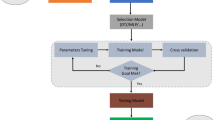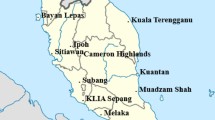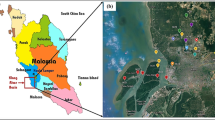Abstract
Accurate prediction of monthly runoff is critical for optimal water resource allocation. However, previous studies mainly focused on the direct prediction of the decomposition sequence, ignoring the error accumulation and the increase in calculation time. In addition, the influence of each sequence on the prediction results was not clarified. Therefore, this study proposes a hybrid prediction method combining time varying filtering-based empirical mode decomposition (TVF-EMD), permutation entropy (PE), a long short-term memory model (LSTM) and a particle swarm algorithm (PSO). Firstly, TVF-EMD is applied for decomposing the original runoff sequences to obtain different components; secondly, PE is applied for characterizing the complexity of different components and reconstructing similar components to obtain new components; then, the decomposed-reconstructed runoff data are predicted by using the LSTM model with PSO based on the analytical studies of different watersheds. The outcomes indicate that the performance index of the proposed model is better than that of the comparison model, improving the prediction accuracy effectively. In addition, the impact of each subseries on prediction performance was also investigated in this study. These findings indicate that the developed model has potential application prospects in runoff prediction and can provide scientific support for water conservancy project operations.








Similar content being viewed by others
Data Availability
The data used in this study can be requested by the corresponding authors.
References
Alsavaf Y, Teksoy A (2022) Applicability of recurrent neural networks to retrieve missing runoff records: challenges and opportunities in Turkey. Environ Monit Assess 194(1):28
An LX, Hao YH, Yeh TCJ, Liu Y, Liu WQ, Zhang BJ (2020) Simulation of karst spring discharge using a combination of time–frequency analysis methods and long short-term memory neural networks. J Hydrol 589
Cheng M, Fang F, Kinouchi T, Navon IM, Pain CC (2020) Long lead-time daily and monthly streamflow forecasting using machine learning methods. J Hydrol 590:15376
Feng ZK, Duan JF, Niu WJ, Jiang ZQ, Liu Y (2022) Enhanced sine cosine algorithm using opposition learning, adaptive evolution and neighborhood search strategies for multivariable parameter optimization problems. Appl Soft Comput 119:108562
Faramarzi A, Heidarinejad M, Mirjalili S, Gandomi AH (2020) Marine predators algorithm: a nature-inspired metaheuristic. Expert Syst Appl 152:113377
Gao H, Fenicia F, Savenije HH (2023) HESS Opinions: Are soils overrated in hydrology? Hydrol Earth Syst Sci 27(14):2607–2620
Haznedar B, Kilinc HC, Ozkan F, Yurtsever A (2023) Streamflow forecasting using a hybrid LSTM-PSO approach: the case of Seyhan Basin. Nat Hazards 117:681–701
Jamei M, Ali M, Malik A, Prasad R, Abdulla S, Yaseen ZM (2022) Forecasting daily flood water level using hybrid advanced machine learning based time-varying filtered empirical mode decomposition approach. Water Resour Manag 36(12):4637–4676
Katipoğlu OM (2023) Evaporation prediction with wavelet-based hyperparameter optimized K-nearest neighbors and extreme gradient boosting algorithms in a semi-arid environment. Environ Process 10:50
Klotz D, Kratzert F, Gauch M, Sampson AK, Nearing G (2020) Uncertainty estimation with deep learning for rainfall-runoff modelling. Hydrol Earth Syst Sci 26:1673–1693
Li BJ, Sun GL, Liu Y (2022) A Hybrid model of ensemble empirical mode decomposition and sparrow search algorithm-based long short-term memory neural networks for monthly runoff forecasting. Front Environ Sci Eng 10:909682
Li H, Zhi L, Wei M (2017) A time varying filter approach for empirical mode decomposition. Signal Process 138:146–158
Lian Y, Luo J, Xue W, Zuo GG, Zhang SY (2022) Cause-driven streamflow forecasting framework based on linear correlation reconstruction and long short-term memory. Water Resour Manage 36:1661–1678
Liu D, Jiang W, Mu L, Wang S (2020) Streamflow prediction using deep learning neural network: case study of Yangtze River. IEEE Access 8:90069-90086
Peng AB, Zhang XL, Xu W, Tian YY (2022) Effects of training data on the learning performance of LSTM network for runoff simulation. Water Resour Manag 36:2381–2394
Tian Z, Li S, Wang Y (2020) A prediction approach using ensemble empirical mode decomposition‐permutation entropy and regularized extreme learning machine for short‐term wind speed. Wind Energy 23(2)
Wu J, Wang Z, Dong J, Cui X, Tao S, Chen X (2023) Robust runoff prediction with explainable artificial intelligence and meteorological variables from deep learning ensemble model. Water Resour Res e2023WR035676
Wang Y, Liu J, Li C, Liu Y, Xu L, Yu F (2023) A data-driven approach for flood prediction using grid-based meteorological data. Hydrol Process 37(3):e14837
Wang WC, Du YJ, Chau KW, Xu DM, Liu CJ, Ma Q (2021) An ensemble hybrid forecasting model for annual runoff based on sample entropy, secondary decomposition, and long short-term memory neural network. Water Resour Manag 35:4695–4726
Xie K, Liu P, Zhang JY, Han DY, Wang GQ, Shen CP (2021) Physics-guided deep learning for rainfall-runoff modeling by considering extreme events and monotonic relationships. J. Hydrol 603:127043
Xu DM, Hu XX, Wang WC, Chau KW, Zang HF, Wang J (2024) A new hybrid model for monthly runoff prediction using ELMAN neural network based on decomposition-integration structure with local error correction method. Expert Syst Appl 238:121719
Xu Y, Hu C, Wu Q, Jian S, Li Z, Chen Y, Wang S (2022) Research on particle swarm optimization in LSTM neural networks for rainfall-runoff simulation. J Hydrol 608:127553
Xue JK, Shen B (2020) A novel swarm intelligence optimization approach: Sparrow search algorithm. Syst Sci Control 1
Yang G, Giuliani M, Galelli S (2023) Valuing the codesign of streamflow forecast and reservoir operation models. J Water Resour Plan Manag 149(8):04023037
Yuan X, Chen C, Lei XH, Yuan YB, Adnan RM (2018) Monthly runoff forecasting based on LSTM–ALO model. Stoch Environ Res Risk Assess 32:2199–2212
Zheng Y, Coxon G, Woods R, Li J, Feng P (2023) Controls on the spatial and temporal patterns of rainfall‐runoff event characteristics‐a large sample of catchments across Great Britain. Water Resour Res e2022WR033226
Zhou J, Wang D, Band SS, Jun C, Bateni SM, Moslehpour M, Ameri R (2023) Monthly river discharge forecasting using hybrid models based on extreme gradient boosting coupled with wavelet theory and Lévy–Jaya optimization algorithm. Water Resour Manag 1–20
Funding
National Natural Science Foundation of China, 51879291, Zhihe Chen.
Author information
Authors and Affiliations
Contributions
XY: data collection, conceptualization, Methodology, Writing—original draft. ZHC: Writing—review & editing, Funding acquisition. MQ: data collection, Writing—review & editing.
Corresponding author
Ethics declarations
Ethics Approval
Not applicable.
Consent to Participate
Not applicable.
Consent for Publication
Not applicable.
Competing Interests
The authors declare that they have no conflict of interest.
Additional information
Publisher's Note
Springer Nature remains neutral with regard to jurisdictional claims in published maps and institutional affiliations.
Rights and permissions
Springer Nature or its licensor (e.g. a society or other partner) holds exclusive rights to this article under a publishing agreement with the author(s) or other rightsholder(s); author self-archiving of the accepted manuscript version of this article is solely governed by the terms of such publishing agreement and applicable law.
About this article
Cite this article
Yang, X., Chen, Z. & Qin, M. Monthly Runoff Prediction Via Mode Decomposition-Recombination Technique. Water Resour Manage 38, 269–286 (2024). https://doi.org/10.1007/s11269-023-03668-w
Received:
Accepted:
Published:
Issue Date:
DOI: https://doi.org/10.1007/s11269-023-03668-w




